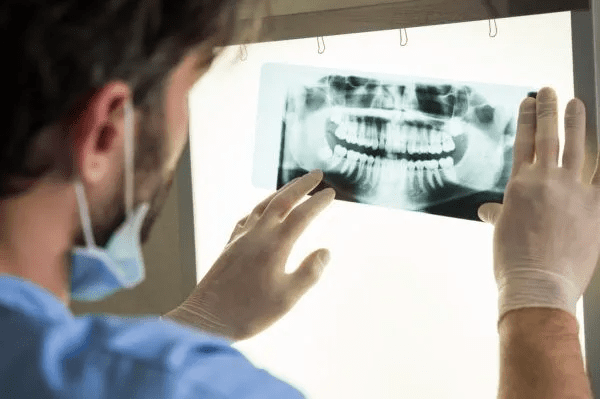What Are X-rays and Imaging?
Dental X-rays and imaging are essential tools in modern dentistry, providing a clear view of the structures within the mouth that are not visible to the naked eye. This includes teeth, gums, jawbones, and surrounding tissues. The technology utilizes ionizing radiation to create images known as radiographs or dental scans, which play a crucial role in diagnosing various oral health conditions. By employing advanced techniques such as digital radiography, practitioners can obtain high-quality images with reduced radiation exposure compared to traditional photographic film methods.
The American Dental Association emphasizes the importance of these diagnostic imaging techniques for effective patient evaluation and treatment planning. With advancements in technology, including cone beam computed tomography (CBCT), dentists can achieve three-dimensional views of the oral cavity, enhancing the precision of diagnoses related to tooth decay, periodontal disease, and other pathologies affecting the mandible and maxilla.
In addition to standard two-dimensional images, panoramic radiographs provide comprehensive views of the entire mouth in a single image. This is particularly useful for orthodontics, oral and maxillofacial surgery, and evaluating overall dental health. These imaging modalities allow for better visualization of complex cases, enabling Dr. Ciancarelli to devise tailored treatment plans that address each patient’s unique needs.
What Problems Do X-rays and Imaging Solve?
Dental x-rays serve as an invaluable tool in identifying issues that may go unnoticed during routine examinations. Conditions like cavities, infections, cysts, and tumors can be detected early through careful analysis of radiographic examinations. This proactive approach helps prevent more severe complications down the line, such as abscesses or even oral cancer.
Furthermore, diagnostic imaging aids in assessing bone density and structure, which is vital when planning procedures such as dental implants or extractions. Understanding the anatomy of the patient’s mouth allows for safer surgeries and improved outcomes. For instance, knowledge about the position of nerves and sinuses can significantly reduce risks associated with surgical interventions.
Additionally, X-rays help monitor ongoing treatments, such as root canals or orthodontic therapy. Regular imaging ensures that any signs and symptoms of complications can be addressed promptly, maintaining optimal oral hygiene and health throughout the process. In pediatric dentistry, it becomes especially important to track the development of permanent teeth and identify malocclusions early on.
What’s Involved in X-rays and Imaging?
Once prepared, the dentist or dental technician positions the X-ray machine appropriately to capture the required images. Modern devices utilize digital sensors that produce immediate results, allowing for instant review and diagnosis. This efficiency reduces wait times and enhances the overall experience for patients seeking timely care.
After capturing the images, Dr. Ciancarelli analyzes them to evaluate the condition of the teeth, gums, and underlying bone structure. Any findings are discussed with the patient, ensuring they understand their oral health status and any necessary next steps. This individualized approach fosters trust and encourages open communication between the patient and provider.
Who Are X-rays and Imaging For?
Dental x-rays imaging is beneficial for individuals of all ages, from children undergoing growth and development assessments to adults requiring evaluations for potential dental diseases. Pediatric patients often need periodic imaging to monitor the emergence of permanent teeth and assess alignment, making it a critical component of preventive care in family-oriented practices.
Adults also benefit greatly from diagnostic imaging, especially those who may exhibit signs of gum disease, tooth decay, or require restorative work such as crowns or bridges. Additionally, patients considering orthodontic treatment will find that imaging plays a pivotal role in determining the best course of action for correcting malocclusion and achieving optimal occlusion.
Moreover, individuals experiencing pain, swelling, or other concerning symptoms should seek imaging to uncover underlying issues. Whether it’s a simple dental exam or a more complex procedure involving oral and maxillofacial surgery, X-rays serve as a key diagnostic tool that guides treatment decisions effectively.
What Are the Benefits of X-rays and Imaging?
The advantages of utilizing dental x-rays with imaging in dentistry extend beyond mere diagnosis. One significant benefit is the ability to detect problems at their earliest stages, leading to less invasive treatment options and better long-term outcomes. Early detection of tooth decay or periodontal disease can save patients time, money, and discomfort.
Another advantage lies in the advancement of technology, particularly with dental X-rays. Digital imaging offers higher resolution images with lower doses of radiation compared to traditional methods. Patients can feel confident knowing that the safety of dental X-rays has been prioritized, minimizing any potential side effects associated with radiation exposure.
Lastly, the integration of imaging into routine dental visits promotes a culture of preventive care. When patients regularly undergo radiographic examinations, they become more aware of their oral health, leading to better hygiene practices and adherence to recommended therapies. This holistic approach ultimately contributes to healthier smiles and enhanced quality of life.
Why Is Long Island Beautiful Smiles Uniquely Qualified to Provide X-rays and Imaging?
Long Island Beautiful Smiles stands out as a premier provider of dental x-rays imaging due to its commitment to individualized care and state-of-the-art technology. Dr. Ciancarelli leads a dedicated team focused on delivering exceptional service in a private practice environment. Each patient receives personalized attention, ensuring their specific needs and concerns are addressed comprehensively.
The practice employs the latest advancements in dental radiography, including digital sensors that enhance image clarity while reducing radiation exposure. This focus on safety aligns with the standards set by national councils on radiation protection and measurements, ensuring patients receive top-notch care without compromising their well-being.
Moreover, the welcoming atmosphere at Long Island Beautiful Smiles fosters a sense of comfort and trust among patients. Dr. Ciancarelli’s expertise in dental x-rays, diagnostics, and treatment planning enables her to guide patients through every step of their journey, making informed decisions based on thorough evaluations. This dedication to excellence makes the practice a reliable choice for anyone searching for X-rays and imaging near me.
Experience Exceptional Care Today
If you’re looking for comprehensive dental X-rays and imaging services, look no further than Long Island Beautiful Smiles. Under the expert guidance of Dr. Ciancarelli, you’ll receive personalized care tailored to your individual needs. Schedule your appointment today by calling (516) 825-0649, or visit us online at our contact page. You can also find us on Google Maps here. Your journey towards optimal oral health starts now!






